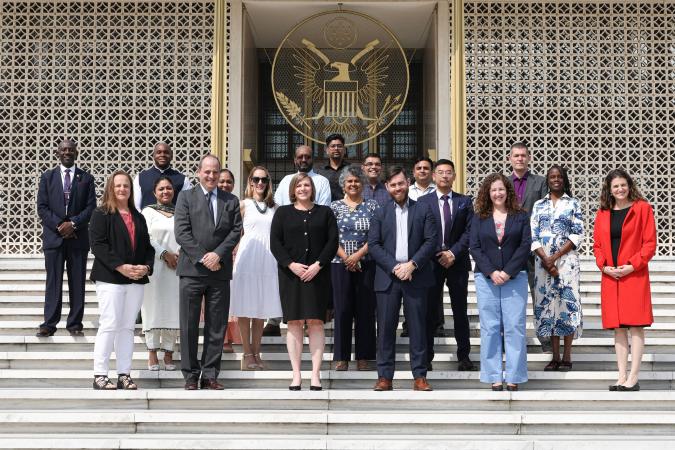Reflections on the 19th International Conference of Drug Regulatory Authorities
FROM A GLOBAL PERSPECTIVE
By Kimberlee Trzeciak, FDA Deputy Commissioner for Policy, Legislation, and International Affairs
December 2, 2024
Kimberlee Trzeciak is the U.S. Food and Drug Administration's Deputy Commissioner for Policy, Legislation, and International Affairs. In this role, she oversees the agency’s engagement with Congress, global partners and state, local, territorial, and tribal policymakers.
Forty-four years ago, the Food and Drug Administration (FDA) hosted the World Health Organization’s (WHO) first International Conference of Drug Regulatory Authorities (ICDRA). Since that landmark event, the FDA has continued working with regulatory counterparts globally to ensure the safety and effectiveness of medical products.
Today the world faces several viral threats, including Mpox and Marburg disease in Africa, Oropouche fever in the Americas, and H5N1, or bird flu, in animals. At the same time, we face growing hesitancy toward vaccines across the globe, along with the potential resurgence of preventable diseases that spread quickly and cause devastating health events.
The COVID-19 pandemic highlighted how quickly infectious diseases can spread across borders, marking how truly connected the health of one nation is to another. To mitigate the devastation, international collaboration was essential, including among national regulatory agencies, to expedite the development and distribution of vaccines, therapeutics, and diagnostic tests. To effectively prepare for future global health threats, global regulatory cooperation must become commonplace.
I recently had the opportunity to participate in the 19th ICDRA meeting in India. Over the course of several days, I participated in plenary panels and directly engaged with dozens of foreign regulators and FDA colleagues. These engagements highlighted the importance of the FDA working with foreign regulators to achieve our shared goal of advancing global health.
Organized by the WHO, ICDRA serves as a global forum for regulators, policymakers, and stakeholders to strengthen drug regulatory systems. ICDRA provided a valuable opportunity to engage with fellow regulators on issues of mutual interest. It enabled the FDA to bring our work on quality to a broader audience. The conference also provided an opportunity to promote the importance of reliance, which enables efficient, effective regulation by leveraging the expertise and regulatory actions of other regulators.
This year’s event in New Delhi, with participation from the majority of WHO member countries, focused on the WHO-Listed Authority (WLA) framework, which sets a globally recognized standard for identifying and assessing advanced regulatory authorities. On May 20, 2024, the WHO recognized the FDA as a WLA for all regulatory functions in medicines, including generic drugs, new chemical entities, biotherapeutics, and vaccines.
My keynote address highlighted the FDA’s perspective on WLAs as a resource to advance regulatory harmonization and strengthen regulatory oversight globally. As discussed at the meeting, the FDA is eager to collaborate with regulators who are interested in achieving such status or wishing to learn from our experience. Various other regulators have adopted reliance models through which they leverage the FDA’s regulatory analysis and actions, and we remain open to sharing insights and working together to strengthen regulatory systems globally.
During the five-day meeting, I also participated in several key discussions. These included bilateral meetings with the European Union, with representation from the European Commission and European Medicines Agency (EMA), and the government of India, with representation from its Ministry and the Central Drug Standards Control Organization (CDSCO) and Ministry of Health, respectively, and finally a trilateral discussion with European and Indian regulatory authorities. This last meeting focused on the potential of advancing a “one quality standard” for medical products – a commitment from countries and expectation that drug manufacturers ensure the same high quality of drug products, no matter where the product is manufactured or used. We discussed a mutual commitment to maintaining such a high standard for pharmaceuticals, and how to act proactively to advance this goal at the national and global level.
The meeting also provided an important opportunity for dialogue. In discussions with colleagues representing Nepal and Sri Lanka, I learned of their resource challenges and eagerness to establish robust regulatory system for medical products. They expressed interest in learning from the FDA, and we will explore ways to help. Such efforts seek to strengthen global regulatory systems, thereby promoting stronger and more reliable global supply chains.
While in India for the conference, I met with the team of experts at FDA India, led by Country Director Greg Smith. It was one of the highlights of the trip. Our team’s hard work and commitment continues to ensure impactful in-country engagement and advances the FDA’s global public health mission. Their ongoing efforts are vital in advancing the FDA’s priorities in India and ensuring continuous progress on the goals set during the ICDRA discussions.
India plays a crucial role for the United States, supplying about 40% of generic drugs prescribed here. That’s one reason why the FDA maintains an office at the U.S. Embassy in New Delhi. During my visit, I had the opportunity to hear from Indian officials and other colleagues about the significance of FDA’s presence on the ground. They shared how other countries seek to emulate our collaborative exchange with Indian regulators and how we engage industry to advance best practices and efficient, effective, transparent regulation. We discussed strengthening our relationship with Indian regulators by creating more engagement and learning opportunities, including activities involving participants from other countries.
In sum, ICDRA presents a valuable opportunity to reflect on our interconnectedness and engage with FDA counterparts from around the world. My trip highlighted the importance of regulators working cooperatively to promote and protect public health and provided a number of helpful opportunities to enable such coordination.
A rising tide that lifts all boats can help ensure a secure, resilient, and high-quality medical product supply chain, benefiting patients in the United States and worldwide.



